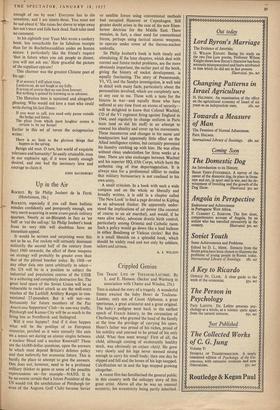Up in the Air
ROCKET. By Sir Philip Joubert de la Fend. (Hutchinson, I8s.) ROCKETS, especially if you call them ballistic missiles confidently and pompously enough, are very merit-acquiring in some avant-garde military quarters. Nearly as un-Blimpish in fact as 'no bull' or 'cut the call-up.' Sir Philip Joubert's book from its very title will doubtless have an immediate appeal.
It would be serious and surprising were this not to be so s For rockets will certainly dominate militarily the second half of the century from (say) 1960 onwards; the effect of these weapons on strategy will probably be greater even than that of the piloted bomber today. By 1968—or any other date one cares arbitrarily to select— the US will be in a position to subject the industrial and population centres of the USSR to a withering and completely destructive fire. The great land space of the Soviet Union will be as vulnerable to rocket attack as are the well-worn reaches of the Larkhill Artillery Ranges to con- ventional 25-pounders. But it will not—un- fortunately for future members of the Pax Americana Supporters' Club—be one-way traffic. Pittsburgh and Kansas City will be as much in the firing line as Sverdlovsk and Stalingrad.
Will it ever happen? And if it does happen What will be the positiqn of us European • countries, perched as it were uneasily like ants on a tennis net during an atomic singles between a nuclear Hoad and a nuclear Rosewall? These are the 64,000-dollar questions, upon the answers to which must depend Britain's defence policy and thus indirectly her economic future. This is hardly the place to attempt to give the answers. One does not, however, need to be a profound military thinker to guess at some of the possible repercussions on—for example—NATO. It is by no means certain that a future President of the US would risk the annihilation of Pittsburgh (or even of the Augusta Golf Club) because Soviet or satellite forces using conventional methods had occupied Hanover or Copenhagen. Still greater doubt arises in the case of the new Eisen- hower doctrine for the Middle East. There remains, in fact, a clear need for conventional forces, perhaps using tactical atomic weapons, to operate under cover of the thermo-nuclear umbrella.
Sir Philip Joubert's book is both timely and stimulating. If the later chapters, which deal with current and future rocket problems, are the more obviously important, the earlier part of the book, giving the history of rocket development, is equally fascinating. The story of Peenemunde, VI, V2, and the Sandys investigation, is well told in detail with many facts, particularly about the personalities involved, which are completely new, at any rate to me. Those with a taste for the bizarre in war—and equally those who have suffered at any time from an excess of security— will be delighted to know that Colonel Wachtel, CO of the VI regiment firing against England in 1944, used regularly to change uniform in Paris taxis (and so did his staff) in an attempt to conceal his identity and cover up his movements. These manccuvres and changes in his name and headquarters had apparently little effect on the Allied intelligence system, but certainly prevented his laundry catching up with him. He was often without clean underclothes for three weeks at a time. There are also exchanges between Wachtel and his superior HQ, 65th Corps, which have the authentic ring of true departmentalism. It is always nice for a professional soldier to realise that military bureaucracy is not confined to his own army.
A small criticism. In a book with such a wide compass and on the whole so liberally and broadly written, it is odd in a chapter called 'The New Look' to find a page devoted to Kipling as an advanced thinker. He apparently under- stood the implications of air power (the coconut of course to an air marshal), and would, if he were alive today, advocate drastic birth control, particularly among Oriental and Catholic races. Such a policy would go down like a lead balloon in either Bandoeng or Vatican circles! But this is a small blemish on a splendid book, which should be widely read and not only by soldiers, sailors and airmen.
A. J. WILSON


































 Previous page
Previous page